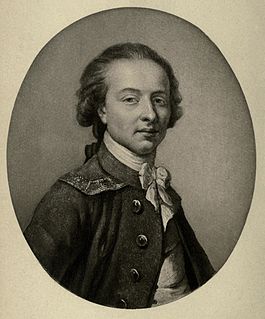A Quote by Arthur Schopenhauer
For what is modesty but hypocritical humility, by means of which, in a world swelling with vile envy, a man seeks to beg pardon for his excellences and merits from those who have none? For
whoever attributes no merit to himself because he really has none is not modest, but merely honest.
Related Quotes
His constant fight is with the Nafs (self-interest), the root of all disharmony and the only enemy of man. By crushing this enemy man gains mastery over himself; this wins for him mastery over the whole universe, because the wall standing between the self and the Almighty has been broken down. Gentleness, mildness, respect, humility, modesty, self-denial, conscientiousness, tolerance and forgiveness are considered by the Sufi as the attributes which produce harmony within one's own soul as well as within that of another.
Only a great man, believe me, and one whose excellence rises far above human failings, will not allow anything to be stolen from his own span of time, and his life is very long precisely because he has devoted to himself entirely any time that became available. None of it lay uncultivated and idle, none was under another man's control, for guarding it most jealously, he found nothing worth exchanging for his own precious time.
There is a time in every man's education when he arrives at the conviction that envy is ignorance; that imitation is suicide; that he must take himself for better, for worse, as his portion; that though the wide universe is full of good, no kernel of nourishing corn can come to him but through his toil bestowed on that plot of ground which is given to him to till. The power which resides in him is new in nature, and none but he knows what that is which he can do, nor does he know until he has tried.
None of our men are 'experts.' We have most unfortunately found it necessary to get rid of a man as soon as he thinks himself an expert because no one ever considers himself expert if he really knows his job... Thinking always ahead, thinking always of trying to do more, brings a state of mind in which nothing is impossible.
Have I then no work to work in this great matter of my pardon? None. What work canst thou work? What work of thine can buy forgiveness or make thee fit for the Divine favour? What work has God bidden thee work in order to obtain salvation? None. His Word is very plain and easy to be understood, "To him that worketh not, but believeth in Him that justifieth the ungodly, his faith is counted for righteousness" (Rom. 4:5). There is but one work by which a man can be saved. That work is not thine, but the work of the Son of God. That work is finished.
What a wee little part of a person's life are his acts and his words! His real life is led in his head, and is known to none but himself. All day long, the mill of his brain is grinding, and his thoughts, not those of other things, are his history. These are his life, and they are not written. Everyday would make a whole book of 80,000 words -- 365 books a year. Biographies are but the clothes and buttons of the man -- the biography of the man himself cannot be written.
You should rather suppose that those are involved in worthwhile duties who wish to have daily as their closest friends Zeno, Pythagoras, Democritus and all the other high priests of liberal studies, and Aristotle and Theophrastus. None of these will be too busy to see you, none of these will not send his visitor away happier and more devoted to himself, none of these will allow anyone to depart empty-handed. They are at home to all mortals by night and by day.





































